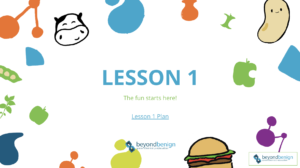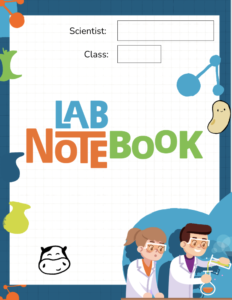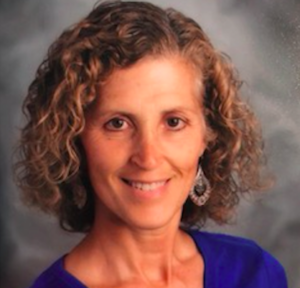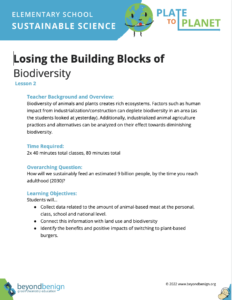
Snapshot from Plate to Planet
Developed by Beyond Benign in collaboration with Impossible Foods and a team of educators, Plate to Planet — a new science-based food unit for elementary school educators — is now officially available. The Plate to Planet module engages students with lessons relevant to their everyday lives to showcase how individual actions can be part of a broader solution for sustainability.
We caught up with Laura Kliman (Impossible Foods Director of New Product Development) as well as Veronica Morabito-Weeks (Beyond Benign Lead Teacher who helped develop Plate to Planet) to discuss why the new curriculum is so helpful in teaching students in grades 3-5 about the challenges of the food system, especially as they relate to biodiversity and climate change.
In Conversation with Laura Kliman

Laura Kliman
What do you think is important about Plate to Planet?
Laura Kliman: The Plate to Planet curriculum is so important because it provides a way for students to engage with real-world challenges — like climate change and its connection to our food system — to learn foundational scientific concepts and standards.

Snapshot from Plate to Planet
The curriculum we helped develop is special in that it puts students in the driver’s seat. The lessons encourage them to become scientists and come up with innovative solutions to real-world problems, creating an understanding of the impact that our everyday choices have on the environment. My favorite part of the curriculum is the yam experiment because it provides that “aha!” moment in which students understand that food is science, and we can use plant-based ingredients in really creative ways to solve scientific problems, all while having fun!
Why did Impossible Foods partner with Beyond Benign on this project?
Laura: Beyond Benign was an obvious partner for us. We share a dedication to sustainability through science, and we were really impressed by their network of incredible teachers who helped us develop a curriculum that will truly work in the classroom for both students and instructors.
Why does Impossible Foods feel that it’s important to create educational materials for students?
Laura: We are on a mission to create a more sustainable global food system and reverse the negative impacts of climate change. To do so, it’s imperative that we create the most delicious and nutritious plant-based meat products while also educating people about the connection between what is on their plate and its impact on the planet.
Students are more curious than ever about what we’re doing to save the planet and how they can help. We want to be part of the movement that gets kids excited about STEM and engaged in being part of the solution. K-12 education is particularly important because around the age of 8, kids start to really think about what they want to do when they grow up, connecting what they learn in school to the real world. Early education is critical to setting the tone and showing students that science is fun and important instead of scary and difficult.
In Conversation with Veronica Morabito-Weeks

Veronica Morabito-Weeks
Why did you choose to be a part of launching this curriculum?
Veronica Morabito-Weeks: I was thrilled to be asked to create a curriculum with Impossible Foods. It was like a dream come true for me because I already believed so strongly in the company.

Snapshot from Plate to Planet
It is so important to teach elementary students about sustainability and empower them to make change at a young age. We have a science unit called “The Science of Food,” and I was able to seamlessly mesh this curriculum into our existing unit of study. However, no matter what science curriculum teachers are using — biodiversity, matter, mixtures and solutions, and much more — I feel they would be able to incorporate Plate to Planet.
How have your students reacted to Plate to Planet?
Veronica: My students absolutely loved this curriculum! They really believed they were food scientists and were so engaged in all of the lessons and activities. One of their favorite labs was the Chinese yam lab. They not only had fun with the yam slime, they found innovative ways to use it.
Why do you think it’s important for young people to learn about science from a sustainability perspective?
Veronica: Sustainability is a hard concept for elementary students to grasp but a concept that is essential to our survival. Once they understand it, they embrace it and look for it in many areas of their lives.
My students are currently working on an app design contest tackling sustainability in sports, particularly in large events held in cities, like the NYC Marathon. The Plate to Planet lessons go hand-in-hand with other meaningful projects, and I know my students will be incredible stewards of our Earth. Many have already made a personal pledge to cut down on their meat consumption in an effort to make change. This was not a teacher-directed concept but rather came from their hearts.
